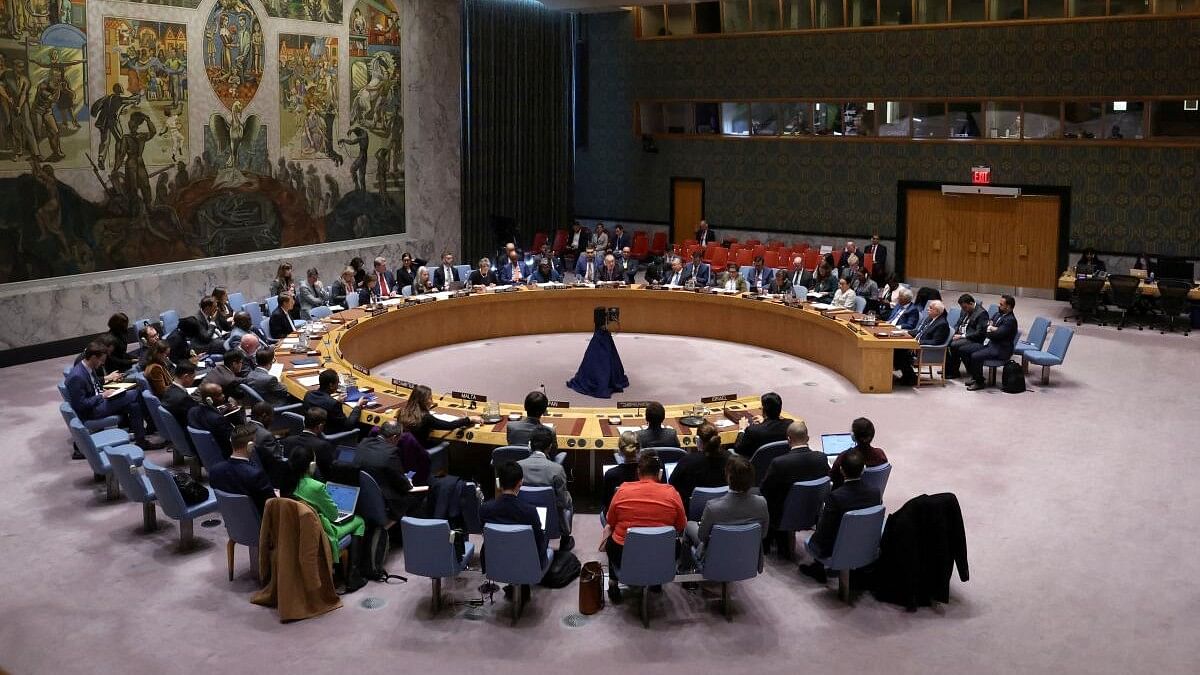
United Nations Security Council meeting at UN headquarters in New York.
Credit: Reuters Photo
Israel and Iran, which have traded major military attacks in recent weeks, exchanged threats and denunciations at an emergency meeting of the United Nations Security Council on Monday, undeterred by other diplomats' quest to ease the hostilities.
Iran's ambassador, Amir Saeid Iravani, told the Security Council that "Iran reserves its inherent right to respond at a time of its choosing to this act of aggression," and he criticized Western countries allied with Israel that, he said, "shamelessly ask Iran to restrain itself and ignore its right to self-defense."
Danny Danon, Israel's ambassador to the UN, directed part of his own comments to the council at Iran, saying: "This is the last warning. Israel has shown restraint, but from now on you will only see strength. Any further aggression will be met with powerful and swift action."
The Security Council meeting was requested by Iran, with the support of Russia and China -- close allies of Iran -- and Algeria, the only Arab country currently holding a seat at the council.
Diplomats and senior UN officials urged both sides to stand down from the cycle of tit-for-tat attacks, which risk further destabilizing the region and expanding into a regional war.
"Belligerent and threatening rhetoric must cease," Khaled Khiari, an assistant UN secretary-general, told the council. "Both sides must stop testing the limits of each other's restraint and act in the interest of peace and stability for the region."
On Saturday, Israel carried out a series of airstrikes on Iran, targeting more than a dozen sensitive sites, including air defense for the capital Tehran, critical energy and oil sites and missile-developing bases. The strikes killed at least four soldiers who were manning the air defense systems, according to Iran's military.
The Israeli strikes came in response to an Iranian attack in early October, in which Iran fired nearly 200 ballistic missiles at Israel to avenge the killing of the leaders of two militant groups it backs -- Hamas in the Gaza Strip and Hezbollah in Lebanon -- as well as the killings of Iranian military commanders. Iranian officials have blamed the United States for providing support and assistance to Israel in the wars in Gaza and Lebanon and in attacks on Iran, and Iravani called Washington "complicit" in the Saturday strikes on Iran.
Linda Thomas-Greenfield, the US ambassador to UN, denied that accusation. "The United States did not participate in this military operation," she said, but acknowledged that the United States had "encouraged" Israel to make its retaliation targeted and proportional.
She stressed that the United States did not want the hostilities to escalate any further. "We believe this should be the end of the direct exchange of fire between Israel and Iran," she said.
In several cities in Iran on Monday, funerals were held for the four soldiers who died in the Israeli attack. Their coffins were draped in Iran's flag and covered in flowers, with uniformed soldiers serving as pallbearers. Grieving families said the soldiers had lost their lives honorably in the defense of their country, according to video broadcast on state television.
Iran appears to still be assessing the damage from the strikes and publicly downplaying their significance and scope. Iran's minister of defense, Amir Aziz Nasirzadeh, told Iranian media on Monday that "Israel's damages were minimal, and we immediately made repairs and replacements."
At the Security Council on Monday, China and Russia strongly condemned Israel, saying it had violated Iran's sovereignty and territorial integrity. They joined a chorus of condemnations from countries including Saudi Arabia, Qatar, Egypt and Turkey.
"Israel is trying tooth and nail to draw Iran into confrontation," Vassily Nebenzia, Russia's ambassador to the U.N., told the council. "And Iran is showing exceptional, for such circumstances, restraint." He accused Israel of violating international law in its attack on Iran and recklessly destabilizing the region.
Iran has been stressing its international backing in the wake of the Israeli strikes. Iran's foreign minister, Abbas Araghchi, told Iranian media on Monday that his country was pleased with the flow of diplomatic support that followed the attack. He said Iran's strategy in confronting Israel had two fronts: "diplomacy and the battlefield."